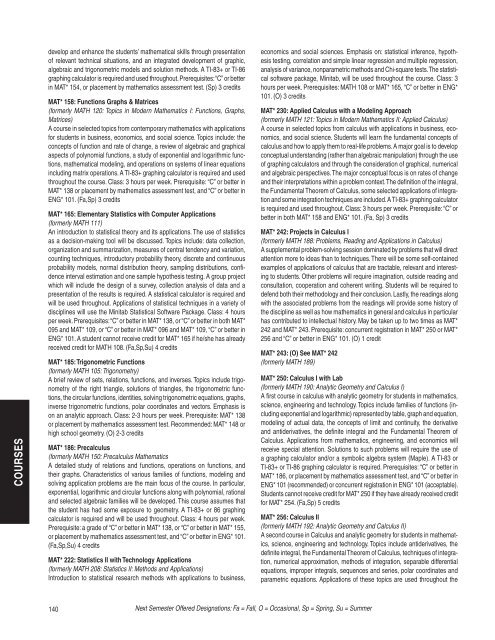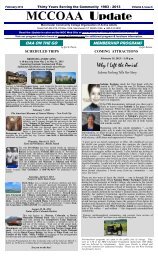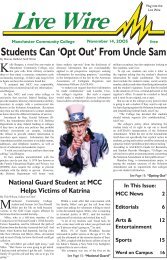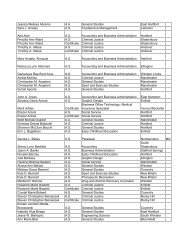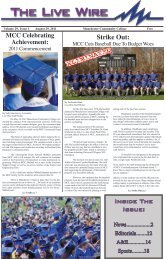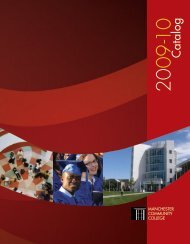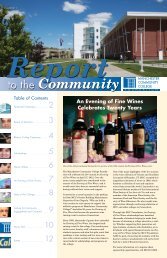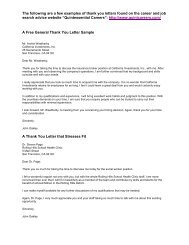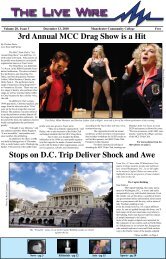Liberal Arts and Science - Manchester Community College ...
Liberal Arts and Science - Manchester Community College ...
Liberal Arts and Science - Manchester Community College ...
You also want an ePaper? Increase the reach of your titles
YUMPU automatically turns print PDFs into web optimized ePapers that Google loves.
COURSES<br />
develop <strong>and</strong> enhance the students’ mathematical skills through presentation<br />
of relevant technical situations, <strong>and</strong> an integrated development of graphic,<br />
algebraic <strong>and</strong> trigonometric models <strong>and</strong> solution methods. A TI-83+ or TI-86<br />
graphing calculator is required <strong>and</strong> used throughout. Prerequisites: “C” or better<br />
in MAT* 154, or placement by mathematics assessment test. (Sp) 3 credits<br />
MAT* 158: Functions Graphs & Matrices<br />
(formerly MATH 120: Topics in Modern Mathematics I: Functions, Graphs,<br />
Matrices)<br />
A course in selected topics from contemporary mathematics with applications<br />
for students in business, economics, <strong>and</strong> social science. Topics include: the<br />
concepts of function <strong>and</strong> rate of change, a review of algebraic <strong>and</strong> graphical<br />
aspects of polynomial functions, a study of exponential <strong>and</strong> logarithmic functions,<br />
mathematical modeling, <strong>and</strong> operations on systems of linear equations<br />
including matrix operations. A TI-83+ graphing calculator is required <strong>and</strong> used<br />
throughout the course. Class: 3 hours per week. Prerequisite: “C” or better in<br />
MAT* 138 or placement by mathematics assessment test, <strong>and</strong> “C” or better in<br />
ENG* 101. (Fa,Sp) 3 credits<br />
MAT* 165: Elementary Statistics with Computer Applications<br />
(formerly MATH 111)<br />
An introduction to statistical theory <strong>and</strong> its applications. The use of statistics<br />
as a decision-making tool will be discussed. Topics include: data collection,<br />
organization <strong>and</strong> summarization, measures of central tendency <strong>and</strong> variation,<br />
counting techniques, introductory probability theory, discrete <strong>and</strong> continuous<br />
probability models, normal distribution theory, sampling distributions, confidence<br />
interval estimation <strong>and</strong> one sample hypothesis testing. A group project<br />
which will include the design of a survey, collection analysis of data <strong>and</strong> a<br />
presentation of the results is required. A statistical calculator is required <strong>and</strong><br />
will be used throughout. Applications of statistical techniques in a variety of<br />
disciplines will use the Minitab Statistical Software Package. Class: 4 hours<br />
per week. Prerequisites: “C” or better in MAT* 138, or “C” or better in both MAT*<br />
095 <strong>and</strong> MAT* 109, or “C” or better in MAT* 096 <strong>and</strong> MAT* 109, “C” or better in<br />
ENG* 101. A student cannot receive credit for MAT* 165 if he/she has already<br />
received credit for MATH 108. (Fa,Sp,Su) 4 credits<br />
MAT* 185: Trigonometric Functions<br />
(formerly MATH 105: Trigonometry)<br />
A brief review of sets, relations, functions, <strong>and</strong> inverses. Topics include trigonometry<br />
of the right triangle, solutions of triangles, the trigonometric functions,<br />
the circular functions, identities, solving trigonometric equations, graphs,<br />
inverse trigonometric functions, polar coordinates <strong>and</strong> vectors. Emphasis is<br />
on an analytic approach. Class: 2-3 hours per week. Prerequisite: MAT* 138<br />
or placement by mathematics assessment test. Recommended: MAT* 148 or<br />
high school geometry. (O) 2-3 credits<br />
MAT* 186: Precalculus<br />
(formerly MATH 150: Precalculus Mathematics<br />
A detailed study of relations <strong>and</strong> functions, operations on functions, <strong>and</strong><br />
their graphs. Characteristics of various families of functions, modeling <strong>and</strong><br />
solving application problems are the main focus of the course. In particular,<br />
exponential, logarithmic <strong>and</strong> circular functions along with polynomial, rational<br />
<strong>and</strong> selected algebraic families will be developed. This course assumes that<br />
the student has had some exposure to geometry. A TI-83+ or 86 graphing<br />
calculator is required <strong>and</strong> will be used throughout. Class: 4 hours per week.<br />
Prerequisite: a grade of “C” or better in MAT* 138, or “C” or better in MAT* 155,<br />
or placement by mathematics assessment test, <strong>and</strong> “C” or better in ENG* 101.<br />
(Fa,Sp,Su) 4 credits<br />
MAT* 222: Statistics II with Technology Applications<br />
(formerly MATH 208: Statistics II: Methods <strong>and</strong> Applications)<br />
Introduction to statistical research methods with applications to business,<br />
140<br />
economics <strong>and</strong> social sciences. Emphasis on: statistical inference, hypothesis<br />
testing, correlation <strong>and</strong> simple linear regression <strong>and</strong> multiple regression,<br />
analysis of variance, nonparametric methods <strong>and</strong> Chi-square tests. The statistical<br />
software package, Minitab, will be used throughout the course. Class: 3<br />
hours per week. Prerequisites: MATH 108 or MAT* 165, “C” or better in ENG*<br />
101. (O) 3 credits<br />
MAT* 230: Applied Calculus with a Modeling Approach<br />
(formerly MATH 121: Topics in Modern Mathematics II: Applied Calculus)<br />
A course in selected topics from calculus with applications in business, economics,<br />
<strong>and</strong> social science. Students will learn the fundamental concepts of<br />
calculus <strong>and</strong> how to apply them to real-life problems. A major goal is to develop<br />
conceptual underst<strong>and</strong>ing (rather than algebraic manipulation) through the use<br />
of graphing calculators <strong>and</strong> through the consideration of graphical, numerical<br />
<strong>and</strong> algebraic perspectives. The major conceptual focus is on rates of change<br />
<strong>and</strong> their interpretations within a problem context. The definition of the integral,<br />
the Fundamental Theorem of Calculus, some selected applications of integration<br />
<strong>and</strong> some integration techniques are included. A TI-83+ graphing calculator<br />
is required <strong>and</strong> used throughout. Class: 3 hours per week. Prerequisite: “C” or<br />
better in both MAT* 158 <strong>and</strong> ENG* 101. (Fa, Sp) 3 credits<br />
MAT* 242: Projects in Calculus I<br />
(formerly MATH 188: Problems, Reading <strong>and</strong> Applications in Calculus)<br />
A supplemental problem-solving session dominated by problems that will direct<br />
attention more to ideas than to techniques. There will be some self-contained<br />
examples of applications of calculus that are tractable, relevant <strong>and</strong> interesting<br />
to students. Other problems will require imagination, outside reading <strong>and</strong><br />
consultation, cooperation <strong>and</strong> coherent writing. Students will be required to<br />
defend both their methodology <strong>and</strong> their conclusion. Lastly, the readings along<br />
with the associated problems from the readings will provide some history of<br />
the discipline as well as how mathematics in general <strong>and</strong> calculus in particular<br />
has contributed to intellectual history. May be taken up to two times as MAT*<br />
242 <strong>and</strong> MAT* 243. Prerequisite: concurrent registration in MAT* 250 or MAT*<br />
256 <strong>and</strong> “C” or better in ENG* 101. (O) 1 credit<br />
MAT* 243: (O) See MAT* 242<br />
(formerly MATH 189)<br />
MAT* 250: Calculus I with Lab<br />
(formerly MATH 190: Analytic Geometry <strong>and</strong> Calculus I)<br />
A first course in calculus with analytic geometry for students in mathematics,<br />
science, engineering <strong>and</strong> technology. Topics include families of functions (including<br />
exponential <strong>and</strong> logarithmic) represented by table, graph <strong>and</strong> equation,<br />
modeling of actual data, the concepts of limit <strong>and</strong> continuity, the derivative<br />
<strong>and</strong> antiderivatives, the definite integral <strong>and</strong> the Fundamental Theorem of<br />
Calculus. Applications from mathematics, engineering, <strong>and</strong> economics will<br />
receive special attention. Solutions to such problems will require the use of<br />
a graphing calculator <strong>and</strong>/or a symbolic algebra system (Maple). A TI-83 or<br />
TI-83+ or TI-86 graphing calculator is required. Prerequisites: “C” or better in<br />
MAT* 186, or placement by mathematics assessment test, <strong>and</strong> “C” or better in<br />
ENG* 101 (recommended) or concurrent registration in ENG* 101 (acceptable).<br />
Students cannot receive credit for MAT* 250 if they have already received credit<br />
for MAT* 254. (Fa,Sp) 5 credits<br />
MAT* 256: Calculus II<br />
(formerly MATH 192: Analytic Geometry <strong>and</strong> Calculus II)<br />
A second course in Calculus <strong>and</strong> analytic geometry for students in mathematics,<br />
science, engineering <strong>and</strong> technology. Topics include antiderivatives, the<br />
definite integral, the Fundamental Theorem of Calculus, techniques of integration,<br />
numerical approximation, methods of integration, separable differential<br />
equations, improper integrals, sequences <strong>and</strong> series, polar coordinates <strong>and</strong><br />
parametric equations. Applications of these topics are used throughout the<br />
Next Semester Offered Designations: Fa = Fall, O = Occasional, Sp = Spring, Su = Summer


